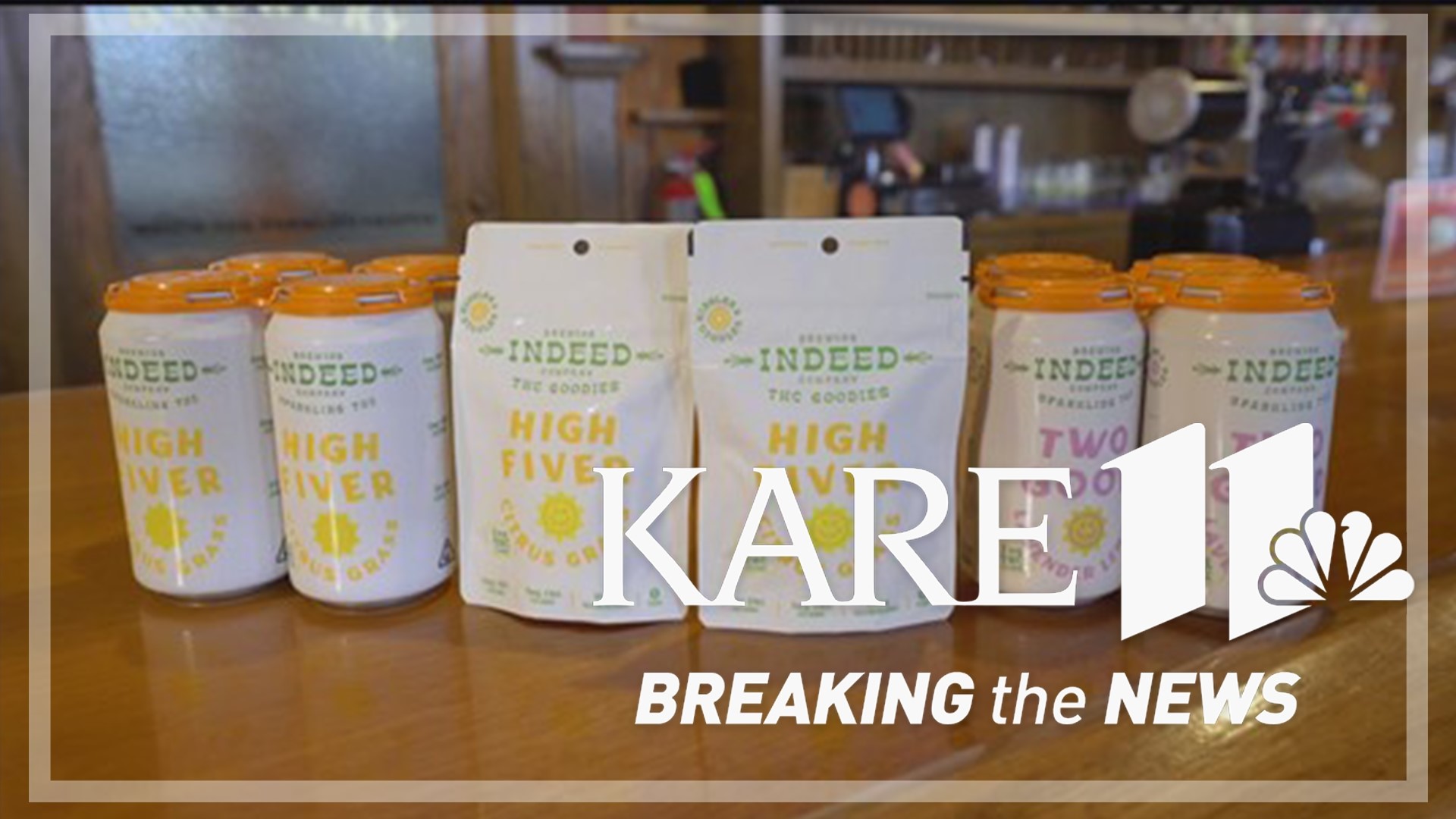MINNEAPOLIS — Recreational marijuana will likely be one step closer to legalization following a vote in the Minnesota Senate on Friday.
As legislators in both the House and Senate prepare to hammer out the details of two different legalization bills in the days to come, questions remain about the impact a new law would have on Minnesota's current, hemp-based THC industry.
Businesses that produce and sell low-potency THC seltzers, gummies and other products containing hemp-derived THC, have had mixed reactions to some of the new regulations, licensing requirements, and taxes that might apply to the products they've sold for the past year.
Hemp-derived THC seltzers and gummies have become popular offerings at Indeed Brewing Company in Minneapolis since they launched in 2022.
"Here in this taproom, every few minutes someone is making a purchase of some sort of THC product," said Tom Whisenand, co-founder and CEO of Indeed Brewing Company. "It's become popular and that's at a time when people are consuming a little bit less alcohol."
Whisenand says he's happy to see the current recreational marijuana bills in the Minnesota House and Senate would both allow breweries to keep producing and selling those hemp-based products. He's also happy to see the bills create a legal path for sales of those products in liquor stores, but he says whether they stay on the menu will likely depend on how prices and demand will shift after legalization.
"So far, what we're doing with hemp-derived products in Minnesota has actually been working really well, consumers like it, businesses like it, it's created a niche business," Whisenand said. "But if you add a huge tax on top of that, if you add on a lot of back-end regulation that causes us to incur costs here at the brewery or any other hemp-derived manufacturer, then that could cause the products to basically be unviable at the commercial level."
Chair of the pro-legalization MN is Ready campaign, Ryan Winkler, says many of the remaining concerns and questions from hemp-derived producers and retailers will be sorted out in the conference committee.
"Most people in the existing THC or hemp industry are very happy with the legislation as it is moving through right now," Winkler said. "The ultimate goal is to keep a thriving hemp industry, a low-potency THC industry."
Winkler helped pass the current hemp-derived THC law as a legislator in 2022, but he says the current bill includes new guardrails to an industry that lacked regulation.
"We are making clear that breweries can create these products; we are making clear that liquor stores can sell them; we are making clear that there are limits on how much THC you can actually sell in a serving or in a product as you're making it and selling it across the state," Winkler said. "So we are keeping open widespread availability but we are creating stronger rules for making sure that it is actually a low-potency product that is being sold across the state."
Steven Brown, the owner of Nothing But Hemp and president of the Minnesota Cannabis Association, says those low-potency products shouldn't be addressed in the same bill as high-potency, recreational cannabis.
"We're for legalization," Brown said. "But the hemp portion of the bill needs serious fixes."
Both Brown and Whisenand are still hoping to see Minnesota expand its definition of "low-potency" products beyond the current limit of five milligrams of THC.
"In most recreational markets you're looking at 10mg of Delta 9 THC," Brown said. "So it's about half the strength is allowed in this state. This bill puts recreational marijuana, which is federally illegal, and legal hemp underneath the same umbrella. This is going to harm many small, black-owned businesses like mine that have never had a seat at the table."
Both the House and Senate bills would currently tax both low-potency THC products at the same rate as high-potency cannabis products, but Winkler says the legislation does not treat the products the same.
"(Hemp-derived THC) is really not regulated in the same way," Winkler said. "Licensing is going to be very easy, you will still be able to buy it in grocery stores and liquor stores, which no state has for adult-use cannabis. You are going to have a low-potency market that is going to be widely available and a high-potency market that is only available in certain places."
Still, Brown says other unanswered questions surrounding taxes and uncertainty around the licensing process, and lag time before regulations go into place, have him worried about his businesses long term.
"We would probably go out of business in Minnesota very rapidly, and so we have plans on moving out of state completely because of the way that this law is written," he said.
Tom says Indeed Brewing isn't going anywhere, but the fate of their THC products are still up in the air.
Kent Erdahl: "Does it feel like the future of THC drinks here will depend on that last negotiation between the two bills?"
Whisenand: "Yeah, I think it does. The devil is going to be in the details and how this all works out economically and regulation-wise is on the other end."
One of the major differences between the two current legalization bills involves taxes. The House bill calls for an eight percent tax for the first four years, which would drop to five percent after that. The Senate bill currently calls for a flat, ten percent tax. Both rates would rank among the lowest marijuana taxes for high-potency products, but the taxes would be high for hemp-derived products. For the last year, those THC products sold in Minnesota have faced no additional taxes.
Watch more Breaking The News:
Watch all of the latest stories from Breaking The News in our YouTube playlist:

